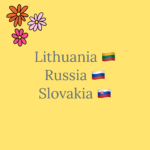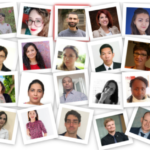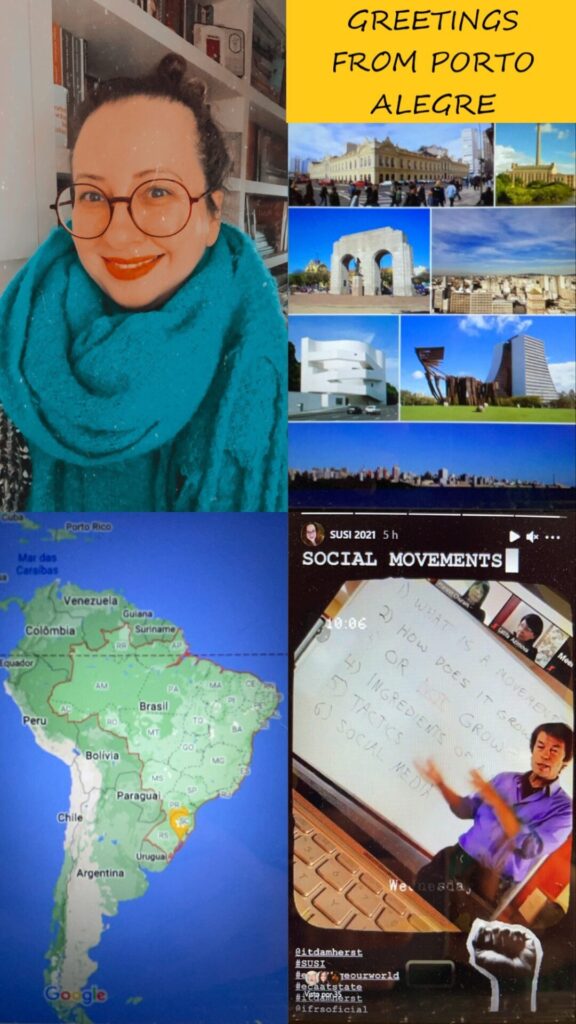
Hello everyone! My name is Daniela Nicoletti Fávero, I am an English/Portuguese teacher at IFRS. I live with my partner, our cats and dog in a city called Porto Alegre, located in the southernmost state of Brazil. Some of the things you ought to know about me is that I love Irish Literature (I am a proud Joycean) and travelling, I am a great (but perhaps not humble) cook and homebrewer and I am really happy to share with you my thoughts on this amazing SUSI experience, hoping that soon enough we can all meet in the US!
I guess it is fairly safe to say that when we got that email announcing our selection for the 2021 Study of the United States program we became filled with excitement and expectations for what was to come. Little did we know, however, that on getting to know a little more about the history, the politics and the culture of the United States we would be also looking into our own countries and, better yet, for the countries of our colleagues scattered around the globe.
Each session begins with greetings that range from Good Morning, Good afternoon, Good evening or even Namaste. It’s as if we are all a bunch of people as different as night and day whose common interest resides in education and ways of providing our students with the best learning experience that we may offer.
I for instance am writing you from this account from Porto Alegre, in the South of Brazil, pumped with the chance of demystifying some of the stereotypes on the US that I kind of grew up hearing about and inspired to share with my students from IFRS how listening to Jazz can be an exercise on democracy, and how Billie Holiday’s Strange Fruit is a powerful portrayal of the plague that racism was, and still is in our society. I dare to say that Lady Day would probably enjoy Elza Soares’ denunciation of racism in Brazil in the song A carne, in which the Brazilian sings “A carne mais barata do mercado é a carne negra” (“The cheapest meat in the market is the black meat’).
It has been 11 days since our first session and though we still have some other ones on the horizon, I believe it is fair to say that we all will leave this experience wanting for more, because our thirst for knowledge is what inspires our actions, to Professor Watson masterful session on the importance of the social movements and activism. We all have, after all, the common motivation which is critical education and we are all dedicated members of a movement that believes that our stronger ties are our personal relationships, whether we can all be in the same place at the same time, or maybe we are opening our cameras in what used to be the privacy of our homes during these pandemic times, for we believe in the message by Margaret Mead that Professor Watson kindly shared with us in the end of his session: “Never doubt that a small group of committed individuals can change the world indeed, it’s the only thing that ever has”.
We are the people…but which “we” are we talking about?
My name is Kamila Zhakupova. I am from the northern part of Kazakhstan. I teach English as a second language in a classical school for gifted children. I have a BA at Foreign languages and MA in Humanities. I have been teaching secondary and primary school students for 6 years. I am passionate about learning new things and travelling around the world.
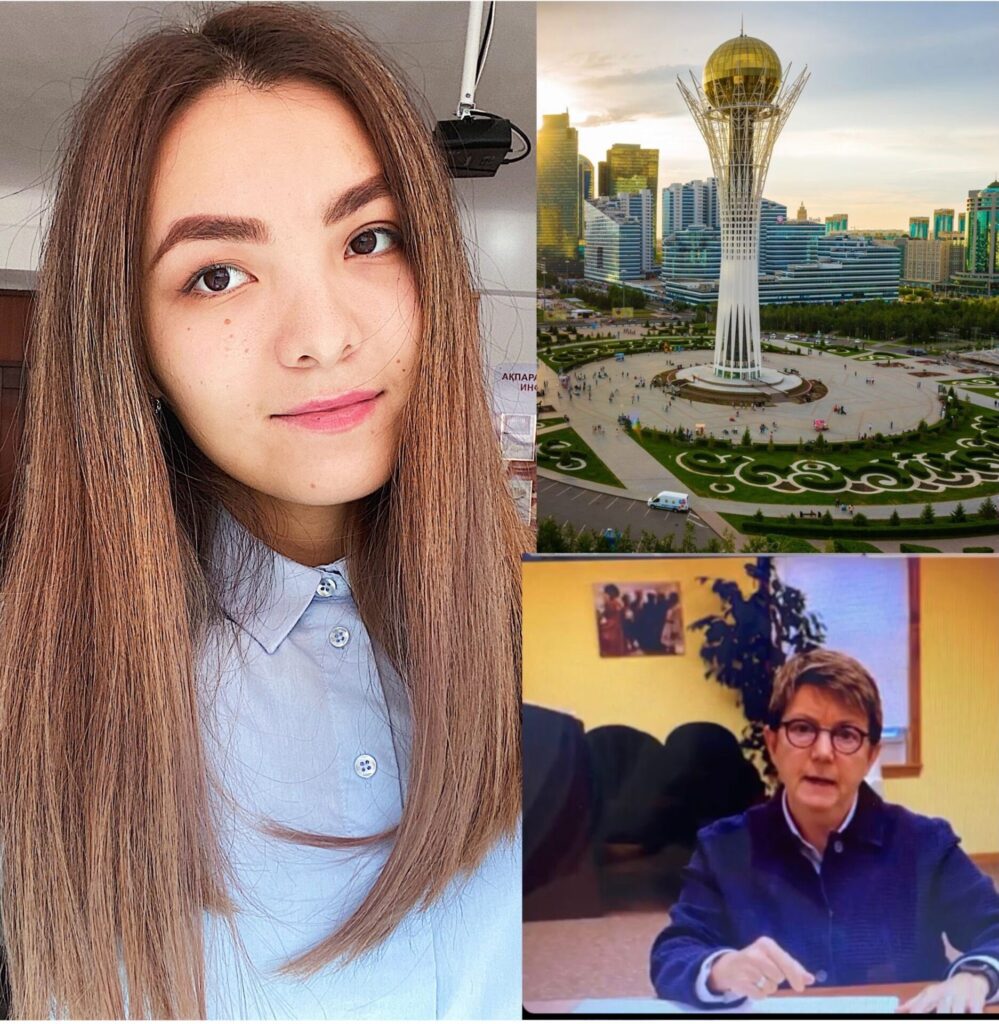
On June 14 Professor Martha Umphrey presented an overview of the topic “Equal protection and privacy in the US constitutional law”. She demonstrated how the Supreme Court of the US applied constitutional language on some groups of society in certain practical cases. This language was abstract and didn`t provide a chance to fully understand who was entitled to the protection of the privacy. I really liked the format of the meeting and it was the most memorable session of my study to date.

The material about equality and equity that had been presented gave me a great opportunity to compare civil rights in the US and Kazakhstan and to find common similarities and differences. It helped me to raise my personal awareness about constitutional language and its usage in laws and changed my professional view of people’s rights in the US and my country. I will definitely try to apply this knowledge to broaden my students` vision of the US society and rights at my lessons and to help my colleagues in Kazakhstan look at civil rights and equality from a different point of view.
Culture, Music, Rights & More
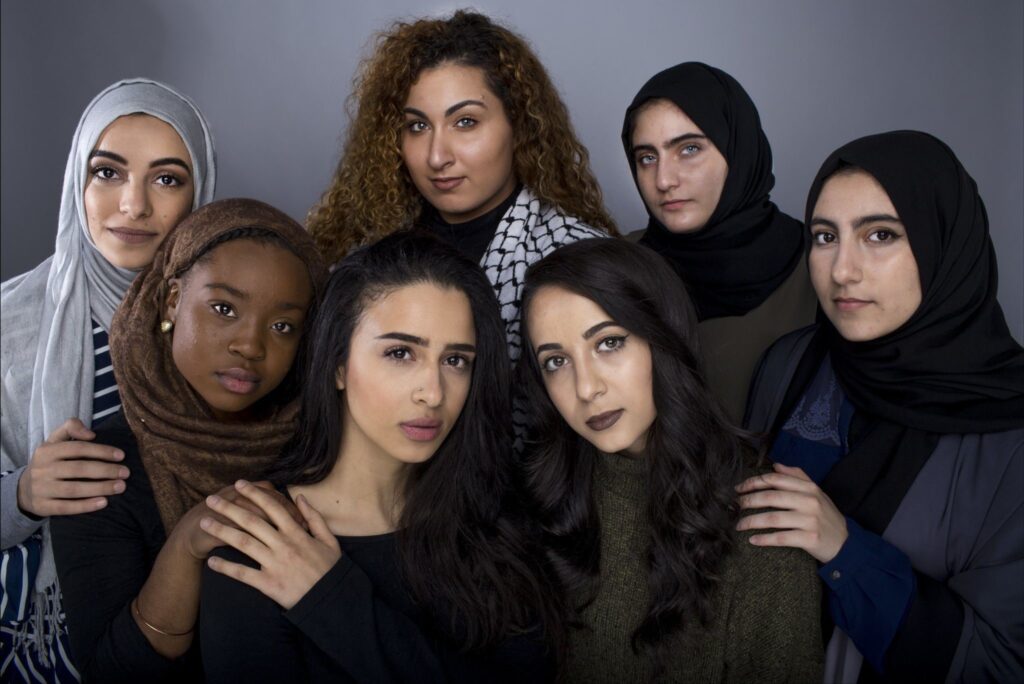
Hello everyone, my name is Riziq Armoush, currently working as a high school Social Studies teacher and leading the Individuals and Societies department at Ramallah Friends School. The Ramallah Friends School is a 150 year old highly performing International Baccalaureate Quaker school. I am also serving as the coordinator for the Creativity, Activity, and Service program (CAS). Through my experience as an educator and CAS coordinator, I found students very passionate and filled with curiosity to understand the world they live in from a global angle. Living in a time that there is an overabundance of information, I have found students in a desperate need to be guided to truth.
On a personal level, there are several fields that interest me, these include natural sciences, politics, music and cinematography. I also like reading different articles from different subjects in order to enrich my knowledge to deliver a better understanding of the world and humanity to my students.
Islam in America: I was fascinated by the way Salman Hameed presented Islam in the United States. He portrayed Islam more as an identity than a strict religion. He highlighted the struggles and challenges faced Muslim communities in the United States after the tragic events of 9/11. His journey reflected the excruciating pain endured by the Muslim minorities to reach acceptance and to be treated once again as a normal US citizen. In his presentation he demonstrated that Islam in the US these days is more of a culture aspect than religion rules and obedience.
Jazz and cultural Democracy: Using the music of Jazz as a political and social tool was very relatable to me. Coming from an oppressed state living under occupation, music was a tool that reflected the different stages of the Palestinian struggle. It was an essential component to most revolutionary movements in modern history. Arts in general especially music help any social movement to directly reach their audience and instill change.
All opinions expressed by the program participants are their own and do not represent nor reflect official views from the Bureau of Educational and Cultural Affairs of the U.S. Department of State, or of the Institute for Training and Development, Inc.


